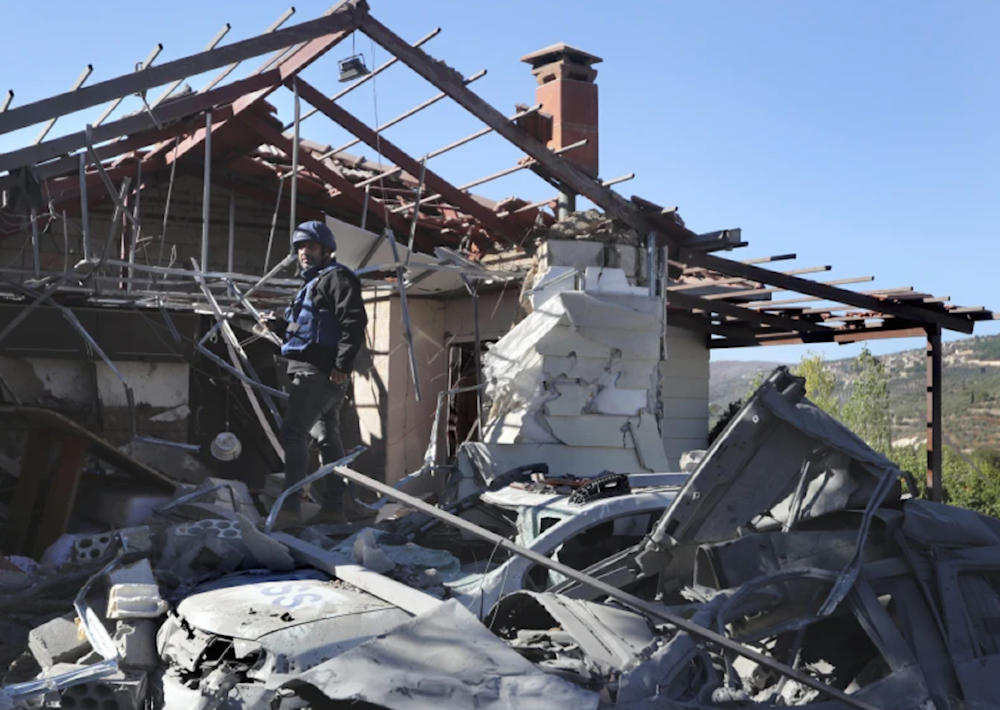Lebanon state media says Israeli fire wounds 2 journalists in south
Video journalist Abdelkader Bay tells AFP that he was reporting in Khiam with two other visual journalists when bullets were fired, injuring him and a colleague.
-

A journalist observes the site where an Israeli airstrike hit a compound housing journalists, killing three media staffers from two different news agencies according to Lebanon's state-run National News Agency on October 25, 2024 (AP)
Two journalists were wounded Wednesday by Israeli fire while reporting from a border village where Israeli occupation forces and Hezbollah engaged in fighting until a truce was declared, according to Lebanese state media.
"Israeli enemy forces in the town of Khiam opened fire on a group of journalists while they were covering the return of the residents and the Israeli withdrawal from the town, wounding two," the nation's National News Agency reported.
Video journalist Abdelkader Bay told AFP that he was reporting in Khiam with two other visual journalists when bullets were fired, injuring him and a colleague.
"We saw people checking on their homes and, at the same time, we were hearing the sounds of tanks withdrawing," Bay added, adding that the other wounded journalist was in the hospital.
"While we were filming, we realized there were Israeli soldiers in a building and suddenly they shot at us," he recalled, adding it was "clear we were journalists."
Photographer Ali Hachicho was with Bay in Khiam when the event occurred, but he was not hurt. They both stated that they observed a drone over the town before the bullets were fired.
Hachicho told AFP that he noticed Israeli troops nearby and "when I put the camera to my eye to film them, I started hearing the sound of bullets between our feet," he said.
Later on Wednesday, the Israeli occupation military imposed restrictions on nighttime mobility in southern Lebanon.
Probes: IOF strike killing Al Mayadeen, Manar crews possible war crime
"Israel" used a US-made munition in an airstrike on October 25 in South Lebanon, which targeted and killed three journalists and injured three others, a Guardian investigation revealed, which legal experts have classified as a potential war crime.
At 3:19 am on October 25, an Israeli fighter jet dropped two bombs on a chalet where three journalists were staying—Al Mayadeen's cameraman Ghassan Najjar and technician Mohammad Reda and Al Manar's cameraman Wissam Qassem.
The three journalists were killed while they slept. The attack also wounded three other journalists from various outlets who were staying nearby. There had been no fighting in the area before or at the time of the strike.
The Guardian visited the site, spoke with the property owner and journalists who survived the attack, examined shrapnel recovered from the scene, and traced Israeli surveillance equipment near the journalists' location. Based on these pieces of evidence, three international humanitarian law experts concluded that the attack could qualify as a war crime and called for a thorough investigation.
“All the indications show that this would have been a deliberate targeting of journalists: a war crime. This was clearly delineated as a place where journalists were staying,” said Nadim Houry, a human rights lawyer and executive director of the Arab Reform Initiative.
A separate investigation by Human Rights Watch corroborated these findings, determining that Israeli forces carried out the attack using US-made weapons, including a JDAM guidance kit.
“Israel’s use of US arms to unlawfully attack and kill journalists away from any military target is a terrible mark on the United States as well as Israel,” said Richard Weir, senior crisis, conflict, and arms researcher at Human Rights Watch.
“The Israeli military’s previous deadly attacks on journalists without any consequences give little hope for accountability in this or future violations against the media.”
Human Rights Watch, in its report, stated that the aggression was most likely a deliberate attack on civilians and an apparent war crime.
To justify the attack, the Israeli occupation claimed it had targeted a "Hezbollah military structure" where "terrorists were located inside the structure." However, just hours later, the occupation released a statement that the incident was "under review" after reports emerged that journalists were the target of the strike.

 4 Min Read
4 Min Read








